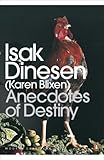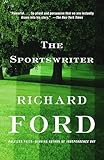
 It has come to my attention that a favorite interview question for authors, especially debut authors, is what you did before you were a published. There is the vague compulsion when answering that the more outlandish, the better. The idea is that the reader, and aspiring authors out there, are interested in a Susan Boyle-like rags-to-riches story. Cab driver to Best Seller? Yes! Grocery clerk to Nobel Prize winner? Cool! As if literary success — and that’s a flexible definition that would require its own essay — were akin to winning the lottery, or better yet, being struck by lightning. These lists give one the impression that deciding to write came more as a whim, that one day while cutting someone’s hair, the idea for scribbling down Anna Karenina occurred. Or while working as a short-order cook, one decided on the plot of Babette’s Feast. What is behind the fascination of such lists and what are the realities?
It has come to my attention that a favorite interview question for authors, especially debut authors, is what you did before you were a published. There is the vague compulsion when answering that the more outlandish, the better. The idea is that the reader, and aspiring authors out there, are interested in a Susan Boyle-like rags-to-riches story. Cab driver to Best Seller? Yes! Grocery clerk to Nobel Prize winner? Cool! As if literary success — and that’s a flexible definition that would require its own essay — were akin to winning the lottery, or better yet, being struck by lightning. These lists give one the impression that deciding to write came more as a whim, that one day while cutting someone’s hair, the idea for scribbling down Anna Karenina occurred. Or while working as a short-order cook, one decided on the plot of Babette’s Feast. What is behind the fascination of such lists and what are the realities?
Which brings me to Susan Boyle. My husband dragged me to the computer to watch a YouTube video of her singing, which I frankly didn’t want to watch, and yet, I, along with 60 million other people quickly felt my heart in my throat. Why? Because, to quote the movie Jerry Maguire, we live in a cynical world, because most of us are like the snickering girl in the audience — one look at Susan, and we know lightning isn’t going to strike there. And yet, deep down, we all want the playing field to be level, for the underdog — those not well connected, pedigreed, likely — to succeed. We root for Rocky Balboa, the self-published grandmother, and the short-order cook to pen a masterpiece. These profiles feed into that fantasy as much as those commercials that promise you thin thighs in two weeks. So what happens when the writer achieves that holy grail of a published book?
What the profiles fail to reveal is that the literary apprenticeship is a lengthy one for the majority, that getting published at all is difficult, and to get paid enough to not do anything else but write is virtually a dream. The supposed average money earned by a novelist is $10,000, but if that novel takes two years to write, then cut that in half, $5,000. As one online article trenchantly stated: “Most novelists and story writers would make more money if they worked full-time at McDonald’s.” Ouch! Susan Boyle got beat by a silly dance troupe, but went on to make a bestselling CD sold round the globe. Those of us with a new book coming out? Not so much.
In fact, those jobs that are so intriguing are precisely the reason books aren’t getting written. During my own apprenticeship, I wrote in the park while working on remodeling houses, wrote in the afternoon while trading stocks in the morning, worked in an art studio doing bookkeeping, writing at night, but all through that I considered myself a writer, although I didn’t tell anyone because I didn’t make my living that way. When the technology market crashed, I found myself with more time on my hands to write.
Writing as a paying profession has always been an insecure proposition. Tolstoy, born into the aristocracy, flunked out of college and lived a playboy existence running up gambling debts, escaping them by running off to join the army. All of these experiences are in his books. Later he ran his estate and wrote. Tolstoy, in short, had a trust fund. Are there any nascent epics being written in the service area of McDonald’s, I wonder?
Honoré de Balzac is a writer more of us can empathize with. According to the Wikipedia entry for him, “he turned his back on law after wearying of its inhumanity and banal routine.” Hear you there, Honoré. A key fact of Balzac’s career — he wrote 100 novels and plays, all the while trying his hand at a bunch of different jobs in order to earn his living. He failed at all these money-making pursuits. His end was particularly troubling for me: According to the favored, possibly apocryphal story, while writing to the point of exhaustion in order to pay bills, he supposedly overdosed on countless cups of very strong coffee!
 The truth for most writers, then and now, is that the majority of those jobs both fuel our fiction and keep us from writing it. Richard Ford famously wrote two novels that didn’t sell well, and he gave up fiction for sports writing. When the magazine he was writing for folded and Sports Illustrated didn’t hire him, Ford had some time on his hands. Then came his breakthrough novel, The Sportswriter. The rest is history.
The truth for most writers, then and now, is that the majority of those jobs both fuel our fiction and keep us from writing it. Richard Ford famously wrote two novels that didn’t sell well, and he gave up fiction for sports writing. When the magazine he was writing for folded and Sports Illustrated didn’t hire him, Ford had some time on his hands. Then came his breakthrough novel, The Sportswriter. The rest is history.
James Ellroy kept working as a caddie through six novels, and used his advance on the seventh to do his own promotion. Richard Russo, Michael Ondaatje, and many others kept teaching until they reached a level of readership through several books where it made more sense to write than teach. Of course, these are the success stories, authors whose names we recognize.
There are writers who shall remain nameless who gave up lucrative careers in law to go get an MFA, who are now languishing at community colleges teaching English composition. Still no big book contract. I know, I know, Honoré hated the law. Then there are the ones who failed to earn out, the chilly story of “Jane Austen Doe” in Salon and her tale of diminishing book advances. Others who wrote one book and never a second one, who gave up and went back to regular careers, or who went to graduate school. Is it Darwinian survival of the most talented, or has writing now more than ever become an avocation rather than a career? Does society owe you a living if you make a product no one is buying? Has fiction writing turned into a hobby?
Perhaps a writer like Jacob Appel is the future. With both law and medical degrees, as well as an MFA (as well as being licensed as a New York City sightseeing guide so he’s the quirky arc all ready), Jacob, while practicing medicine, has also managed to publish over one hundred short stories in almost every literary journal out there, as well as win many short story prizes. And he writes plays.
Jacob said that a windfall in writing might cause him to curtail his hours practicing medicine, but he would never quit it. “… if one spends enough time away from the world where people have to go to work every morning, one risks losing touch with the life one wants to capture on the page. Waking up at noon and writing in one’s pajamas may have worked for Samuel Johnson, but it’s a dangerous recipe for most of us.” In the interests of full disclosure, I will report that I emailed Jacob at four in the morning, and he answered within five minutes. I don’t think the guy sleeps. And I’m typing this right now at noon. In my pajamas.
The majority of writers I know have a complicated mosaic of various jobs, juggling writing, teaching, freelancing, family. It is difficult, and it is a necessity, and most of us who keep doing it can’t imagine doing anything else. When I asked Jacob about the even greater financial difficulty of being a short story writer, he said: “The people who love short fiction, I believe, are writing already, even without financial incentives.” I believe the same can be said for most novelists out there. Will some of the magic leave the author profile when it goes something like this:
student, short-order cook at McDonald’s, lawyer, novelist, teacher, short-order cook at McDonald’s
I am very grateful to have a novel coming out this year. I still work part-time with my husband, take on freelance projects when I can get them, still teach part-time. I have hopes that I might be lucky enough to sell my second novel. I will keep the want-ads close.
Bonus Link: Working the Double Shift









